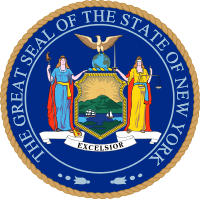Origin of the name "Empire State"

The U.S. State of New York has been known by many nicknames, most notably as the Empire State, adopted as late as the 19th century. This nickname has been incorporated into the names of several state buildings and events, and is commonly believed to refer to the state's wealth and resources. However, the origin of the term remains unclear.
There are several theories on the origin of the name. Two of them involve George Washington, one credits aggressive trade routes, and another associates the nickname with New York exceeding Virginia in population. None has been proven. One commonly accepted tale says that, when Washington was given a full map of New York prior to the Battle of New York, he remarked on New York's natural geographic advantages, proclaiming New York the "Seat of an Empire".
The origin of the term has puzzled many historians; as American writer Paul Eldridge put it, "Who was the merry wag who crowned the State ... [as the Empire State]? New York would certainly raise a monument to his memory, but he made his grandiose gesture and vanished forever."[1]
History
The source of the term "Empire State" is uncertain. It has been attributed to the state's wealth and resources,[2] but there is some doubt regarding that. Two possible stories involve America's first president George Washington.
The first refers to an April 10, 1785 letter to New York City Mayor James Duane in which Washington called New York "the Seat of the Empire". Washington is also said to have used the phrase "Pathway to Empire" once when referring to the state in conversation with Governor George Clinton in the 1790s; no documentation exists for this exchange, however.[1]
Alexander Flick's History of New York State claims that the title was used as early as 1819, coinciding with New York surpassing Virginia in population. He does not provide any source for this claim. Further, Flick adds that the term was "universally acknowledged and accepted" by the time that the Erie Canal was completed in 1825.[1] In a later work, Flick and coauthor John Jacob Anderson claim that "New York is well called the Empire State ... not only because of the vastness of its resources, but because it so conspicuously illustrates the imperial power of law-abiding liberty among the people."[3]
Milton Klein proposes in The Empire State: A History of New York that the name may have accompanied the success of the Black Ball Line in 1818 "because of the signal advantage the regularity of shipping gave to New York's merchants over those in other coastal cities." He claims that, by 1820, it was clear that "Empire State" was in wide use, though he is doubtful that a clear origin of the term will ever be determined. The 1940 Guide to the Empire State included the following quotation: "...it would gratify the people of New York if they could discover who first dared that spacious adjective."[1]
Namesakes


New York is widely known by the nickname "Empire State", and its effects can be seen throughout the state.[1] Manhattan's Empire State Building opened in 1931 and was the world's tallest building until the completion of the north tower of the World Trade Center in 1970. Following the September 11 attacks, the Empire State Building once again became the tallest building in Manhattan until One World Trade Center claimed the title in April 2012.[4][5] The main offices of state government are located at the Empire State Plaza (ESP) in Albany, the state capital. Its most iconic structure is the Erastus Corning Tower, the tallest building in New York outside of New York City.[6]
The nickname has also been used for train routes. The Empire State Express of the New York Central Railroad was established in 1891, and Amtrak currently offers its Empire Service from New York City to Buffalo via Albany.[1] SUNY Empire State College was established in 1971 in Saratoga Springs and makes use of the name.[7] The Empire State Games were established in 1978 as an Olympic-style competition for amateur athletes from New York.[8] Additionally, the term "Empire State" has been included on New York State license plates since 2001.[9] In 2009, Jay-Z and Alicia Keys released the 5x-platinum single "Empire State of Mind."
See also
References
- 1 2 3 4 5 6 7 New York State Historical Association (2001). Milton M. Klein, ed. The Empire State: A History of New York. Ithaca, NY: Cornell University Press. pp. xix–xx. ISBN 0-8014-3866-7.
- ↑ Shearer, Benjamin; Barbara S. Shearer (2002). State Names, Seals, Flags, and Symbols: A Historical Guide (3rd ed.). Westport, CT: Greenwood Press. p. 9. ISBN 0-313-31534-5.
- ↑ Anderson, John Jacob; Alexander Clarence Flick (1902). A Short History of the State of New York. New York, NY: Maynard, Merrill, & Co. p. 321. OCLC 6812818.
- ↑ Berman, John S. (2003). The Empire State Building. New York, NY: Barnes and Noble Publishing, Inc. p. 9. ISBN 0-7607-3889-0.
- ↑ Dunlap, David (2012-04-29). "With a Steel Column, a Tower Will Reclaim the Manhattan Sky". The New York Times. The New York Times Company. Retrieved 2012-05-09.
- ↑ Waite, Diana S. (1993). Albany Architecture: A Guide to the City. Albany, NY: Mount Ida Press. pp. 81–82. ISBN 0-9625368-1-4.
- ↑ "About Us". Empire State College. Retrieved 2010-09-20.
- ↑ "About the Games". Empire State Games. Archived from the original on 2010-09-12. Retrieved 2010-09-20.; Note that as of 2011, the games have been halted due to budget constraints.
- ↑ Swearingen, Jacquelyn (2001-01-02). "Lady Liberty's License Plate Number Is Up". Times Union. Albany, NY: Hearst Newspapers. p. A1. Retrieved 2011-04-18.
